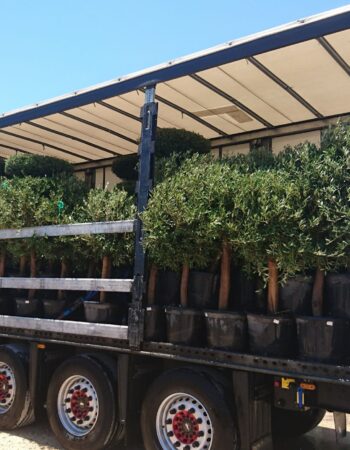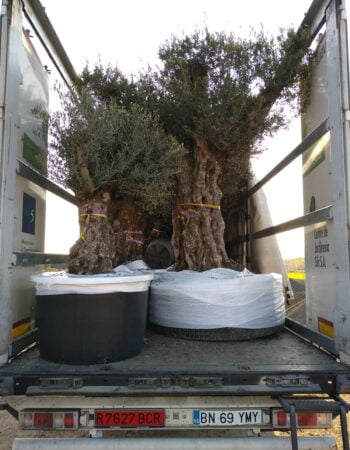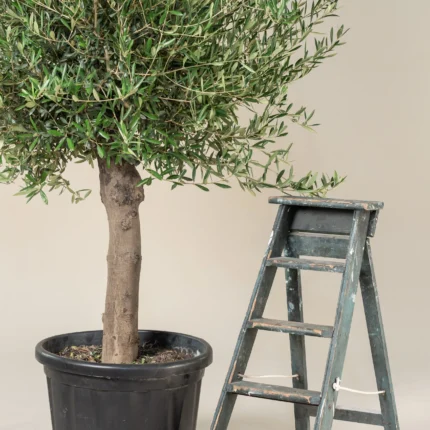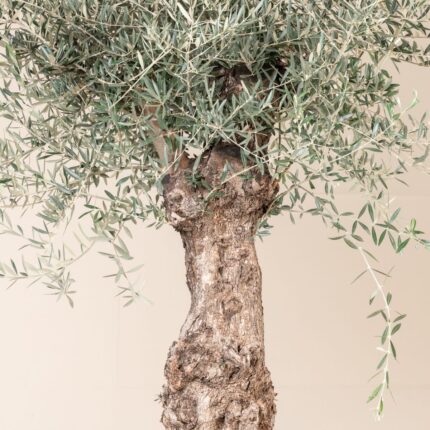Olea Europaea «Copa»
The Olea Europaea «Copa» is a unique variant of the olive tree characterized by its cup-shaped canopy. This distinctive form is achieved through careful pruning and shaping, resulting in a rounded, bowl-like canopy that resembles a cup or bowl. The «Copa» is valued for its ornamental appeal and compact size, making it a stylish addition to both gardens and indoor spaces.
- Botanical Name: Olea europaea
- Common Name: Olive Tree Cup, Copa
- Mature Size: Typically 3-6 feet (0.9-1.8 meters) in height and width, with a rounded, cup-shaped canopy
- Light Requirements: Full sun
- Soil Requirements: Well-draining, gritty soil; a standard olive tree mix or bonsai soil mix is ideal
- Water Needs: Moderate; allow the soil to dry slightly between waterings
- Foliage: Dense, evergreen, silvery-green leaves that contribute to the cup-shaped appearance
- Growth Rate: Slow to moderate
Uses:
- Ornamental: Ideal for decorative purposes in gardens, landscapes, and as a centerpiece in container arrangements.
- Formal Gardens: The rounded, cup-shaped canopy adds a refined touch to formal garden settings.
- Indoor Decor: Can be grown in large containers indoors, providing an elegant and distinctive element to indoor spaces.
Benefits:
- Aesthetic Appeal: The cup-shaped canopy adds a unique and stylish element to any garden or indoor environment.
- Compact Size: Suitable for smaller gardens, patios, and indoor spaces where space is limited.
- Symbolism: Represents peace and longevity, adding meaningful beauty to its surroundings.
- Low Maintenance: Relatively easy to care for with moderate watering needs and minimal pruning requirements compared to other shapes.
The Olea Europaea «Copa» offers the classic charm of the olive tree with a distinctive, cup-shaped canopy, providing an elegant and eye-catching option for enhancing various outdoor and indoor spaces.
Debes acceder para publicar una valoración.


CAREFUL TREE TRANSPORTATION
At Treezom, we take great care in transporting your trees to ensure they arrive in perfect condition. Our expert team uses various methods, depending on the size and volume of the order, to provide safe and efficient delivery. Whether you're ordering a single tree or a bulk order, we guarantee high standards of handling and care throughout the process.
MULTIPLE SHIPPING METHODS
- Truck Delivery: Ideal for local or regional deliveries, ensuring a smooth and timely shipment of your trees directly to your location.
- Sea Containers (20’ or 40’): Perfect for larger orders or international shipping. Our sea containers are equipped to handle bulk shipments with optimal protection.
- Other Customized Solutions: Depending on the size and nature of your order, we can offer tailored shipping methods to meet your specific needs.
No matter the shipping method, we use specialized packaging and handling procedures to protect the trees during transit, ensuring they arrive healthy and ready for planting.
Below, you’ll find key tips tailored to this species’ requirements. Whether you’re new to plant care or have plenty of experience, these guidelines are here to support you in keeping your green companion healthy and vibrant.
- Planting and Potting:
- Use a well-draining pot or planting site with adequate drainage. For container planting, select a pot that supports the rounded canopy.
- Ensure the tree is planted at the correct depth, with the root ball level with or slightly above the soil surface.
- Watering:
- Water the "Copa" thoroughly when the soil surface feels dry. Avoid overwatering, as olive trees prefer slightly dry conditions.
- Reduce watering during winter when the tree’s growth slows.
- Sunlight:
- Place the tree in a location with full sun exposure, ideally receiving 6-8 hours of direct sunlight daily. This promotes healthy growth and maintains the cup shape.
- If grown indoors, ensure it is near a south-facing window or under grow lights to provide sufficient light.
- Pruning and Shaping:
- Regular pruning is essential to maintain the cup shape of the canopy. Trim back new growth to keep the rounded form and remove any unwanted branches.
- Light shaping may be needed to sustain the tree’s distinctive cup appearance. Avoid heavy pruning that could disrupt the shape.
- Fertilizing:
- Feed the tree with a balanced, slow-release fertilizer during the growing season (spring through early autumn). Reduce fertilization during the winter.
- Avoid over-fertilizing, which can lead to excessive foliage growth and imbalance in shape.
- Pest and Disease Control:
- The "Copa" is generally resistant to pests but may occasionally encounter scale insects or aphids. Treat any infestations with insecticidal soap or neem oil.
- Ensure good air circulation and avoid overwatering to prevent fungal diseases.
*This information is provided for informational purposes only. For more detailed care, please consult a professional Gardener or Arborist.




















 Single Tree
Single Tree
Valoraciones
No hay valoraciones aún.